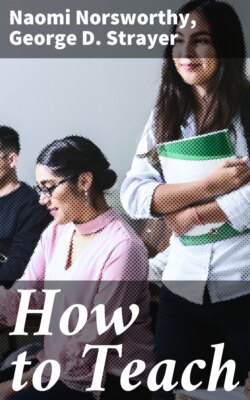Читать книгу How to Teach - Naomi Norsworthy - Страница 5
На сайте Литреса книга снята с продажи.
QUESTIONS
ОглавлениеTable of Contents
1. Why would you not be satisfied with a statement of the aim of education which was expressed in terms of the harmonious development of an individual's abilities and capacities?
2. Suggest any part of the courses of study now in force in your school system the omission of which would be in accordance with the social aim of education.
3. Name any subjects or parts of subjects which might be added for the sake of realizing the aim of education.
4. How may a teacher who insists upon having children ask permission before they move in the room interfere with the realization of the social aim of education?
5. Can you name any physical habits which may be considered socially undesirable? Desirable?
6. What is the significance of pupil participation in school government?
7. How does the teacher who stands behind his desk at the front of the room interfere with the development of the right social attitude upon the part of pupils?
8. Why is the desire to excel one's own previous record preferable to striving for the highest mark?
9. In one elementary school, products of the school garden were sold and from the funds thus secured apparatus for the playground was bought. In another school, children sold the vegetables and kept the money. Which, in your judgment, was the most worth while from the standpoint of the social development of boys and girls?
10. A teacher of Latin had children collect words of Latin origin, references to Latin characters, and even advertisements in which Latin words or literary references were to be found. The children in the class were enthusiastic in making these collections, and considerable interest was added to the work in Latin. Are you able to discover in the exercise any other value?
11. Describe some teaching in which you have recently engaged, or which you have observed, in which the methods of work employed by teacher and pupils seemed to you to contribute to a realization of the social purpose of education.
12. How can a reading lesson in the sixth grade, or a history lesson in the high school, be conducted to make children feel that they are doing something for the whole group?
13. In what activities may children engage outside of school which may count toward the betterment of the community in which they live?
